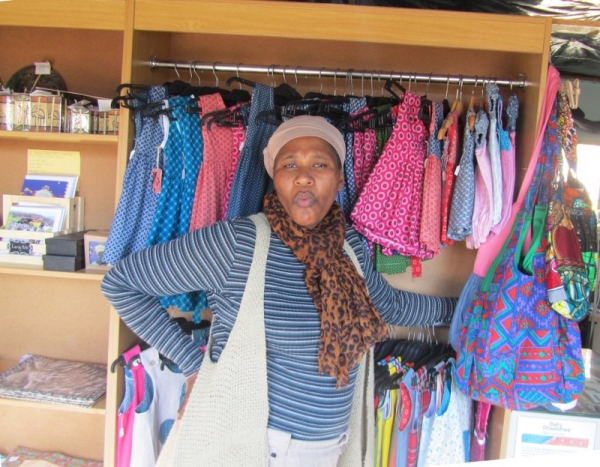

Ndileka Biyo hopes to open a new shop in Cape Town’s Waterfront to sell her “shweshwe children’s clothes”. Photo by Bernard Chiguvare.
25 May 2015
Ndileka Biyo, owner of Rockasa Design in Masiphumelele, has set her sights on a place in the affluent Waterfront.
Biyo started in business when still young, helping her parents sell vegetables in the rural Eastern Cape. Later, when her husband lost his job, she decided to put the sewing skills she had acquired in childhood to good use.
“My husband lost his job in 1988 and I decided to give a hand to the family by sewing stuff for sale. I sold my clothes from as little as R10 because I was looking for quick money to feed the family by end of each day,” says Biyo, who would visit textile factories to find cheap material for clothes.
When the family moved from Lower Crossroads to Masiphumelele, Biyo joined the local library as a volunteer, assisting people who could not use the computers.
She came across Masicorp, an NGO, and found help there to establish her line of “shweshwe children’s clothes,” made from the printed cotton fabric widely used in adult traditional South African clothing.
A government bursary helped her pay fees for a fashion design course at Cape University of Technology and in 2003 she was awarded a Diploma in Fashion Design.
She left the library to start her own project.
“I could see that it is now time I start my own business. I started training local people how to use sewing machines and in fashion design for a year.”
In 2010 Masicorp lent her R30,000 which she used for buying clothing material and to pay for rent on a place to sell her goods in town.
“I started looking for a place to sell my baby shweshwe clothes everywhere. I experimented in town, but this could not work for me because the place was not familiar to people and there was too much similar stuff nearby. So I decided to operate here in the Masiphumelele area.”
Rockasa Design shop is filled with baby clothes priced from R80. The company operates from opposite the community hall.
Biyo currently has one employee who helps with design.
“My stuff is bought by local people and tourists. Tour guides bring tourists to this area and they usually visit my small shop and buy my stuff. Recently, I received a call from a client overseas thanking me for the dress she had bought for a granddaughter,” says Biyo.
“Tourists love natural things. Clients from overseas enjoy the Africaness in my design.”
At weekends Biyo sells her clothes at a stall in Tokai. She has also been asked to design clothes for the elderly, she says.
But the mother of two says she faces some challenges in expanding her business.
“My designs are loved by tourists but people are scared of coming to informal settlements. They do not move around with money. And nearby we do not have ATMs for them to withdraw cash. This has prompted me to think of a safe and easily accessible place for everyone - Watershed in the Waterfront.”
She applied for a place there in January and is hoping her application will be approved.
“I am very confident my design will sell because it is unique and is of high quality. If I discover that my design is similar to my competitors, I simply have to change the design. I am able to do that,” she says.
“My advice to people especially women, is: be strong and never give up if you want to do something. Just go for it.”